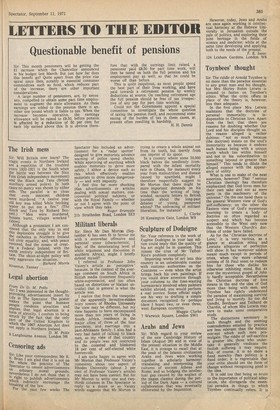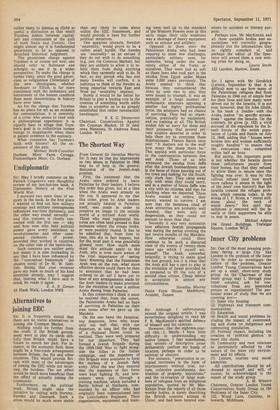Toynbees' thought
Sir: The riddle of Arnold Toynbee is no more than the paradox essential to any great man and his thought, but Mrs Shirley Robin Letwin is pleased to fasten on Toynbee's ethics. What the critic offers in place of the theory is, however, less than adequate.
In the first place Mrs Letwin maintains that the doctrine of
personal immortality is indispensible to Christian love. Apart from the fact that there are reasons for doubting whether Our Lord and his disciples thought so, the reason alleged is rather dubious: "not so much because (the doctrine) insists on the soul's immortality as because it endows each human being with a unique worth which lies within himself and not in his subordination to something beyond or greater than himself." This tends to dilute the alleged essence with the appearance of utility.
What is one to make of the next assertion, however? That "serious Christian theology has therefore emphasized that God loves men for their own sake and not as mere parts in the machinery of the universe." On the one hand there is the general Western view of God's self-sufficiency; on the other the Eastern view of God's mysterious yearning to create a body of doctrine so often regarded as suspect and which has become accessible to the West only now that the Western Church's doctrines of order have failed.
As for the 'Christian doctrine of Love,' it is very various, as a glance at situation ethics and Lewisite allegories of perfection will show. It has moreover seldom meant much except in periods of crisis, when the more ethereal notions of St Paul seem to redeem him for those who dislike his otherwise inhibiting mind. But as ever the mysterious gospel of John is hardly acceptable. Nevertheless the Christian doctrine of love means in the end the idea of God more than being with men, and Toynbee has rightly understood the paradox of maximizing survival and living to mortify. So too did Gandhi, Berdyaev and Teilhard de Chardin, of whom Mrs Letwin may care to make some comparative study. The distinctions necessary in such thought and the seeming contradictions entailed by practice are less relevant than the holistic com:ept which such men promulgate. The riddle of self-sacrifice is greater life; thosewh o undertake it generally vindicate the foolish suffering it may require. But, of course, it is no more a fixed morality than politics is a fixed order; it is regrettable that your critic should see the form of change without recognizing good in the idea.
It is odd too that being so acute to the importance of political adaptation, she disregards the essential paradox in things to which Toynbee continually refers. It is rather hasty to dismiss as clich6 so useful a distinction as that which Toynbee makes between capitalism and communism or the guilt of both Nazis and Zionists. One might almost say it is fundamental gnosticism to be so opposed to detached historical judgement.
The gnosticism charge against Toynbee is of course not new; one should refer to Bultmann and Albright to see it in a wider perspective. To make the charge is rather risky, since the good gnosticism or religionless Christianity of the new theologians, whether Berdyaev or Tillich, is far' more concerned with the endurance and betterment of the human condition than most theoreticians in history have ever been.
As for the charge that Toynbee has no place for art as an occasion for contemplation, it is unworthy of a critic who seems to read with a philosophical experience; it is equally base to allege that Toynbee's goal is to collectivize human beings in megalopolis when there is patent evidence to the contrary. What connexion has Toynbee's faith with history? All the experience of the past.
Michael Brett-Crowther Durham Moor Farm Cottage, Framwellgate Moor, Co. Durham.











































 Previous page
Previous page